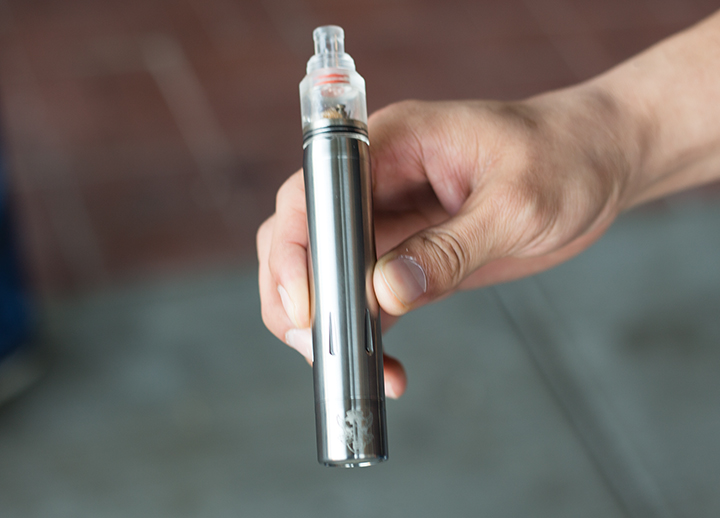
E-cigarette
After nine years of smoking, Ben Dugal decided it was time to switch from the tobacco-filled cigarettes to an alternative: electronic cigarettes.
He made the switch in just a day and has vaped for nearly a year and a half since.
“That’s why I’m here today,” said Dugal, who manages College Park’s Vape Exchange. “It’s all about helping people to get off harmful tobacco and move to a safer product.”
READ MORE: Electronic cigarettes spur local businesses
These e-cigarettes are the target of a bill the Prince George’s County Council Committee on Health, Education and Human Services voted on. The bill, which was voted out of committee Oct. 8 and will soon move on to a public hearing, regulates the distribution, placement and packaging of e-cigarettes and restricts their use in public and senior-citizen housing, as well as drinking establishments.
Todd Turner, one of the council members to propose and present the bill, said the need for regulation is a “public safety issue” unregulated by the state.
“Unlike tobacco, there is no federal regulation. To be honest, you probably have no idea what you’re smoking when you’re vaping,” Turner said. “From the public health perspective, it’s that we don’t know, and we don’t want to wait like we did with tobacco products for decades.”
Dugal said the urge to restrict vaping is natural, given its relatively recent popularity and the lack of research on the subject. Still, he said he hopes the stigma against them will shrink over time and people will see their value in preventing tobacco-related deaths.
READ MORE: Electronic cigarettes offer rewards, risks
Under Maryland’s Clean Indoor Air Act, tobacco smoking is restricted in public spaces, but the state is silent on e-cigarettes.
The only jurisdictions that limit the use of this alternative tobacco product are Baltimore city and Montgomery and Howard counties.
John O’Hara, Maryland Group Against Smokers Pollution president and a strong advocate of the bill, commended the county for taking the step forward to restrict e-cigarette use in public spaces.
“This bill doesn’t stop anyone from smoking or vaping; it just says you can’t do it in places where current tobacco smoking is prohibited. That’s all we’re asking them to do,” O’Hara said. “The stuff is just out of control and we want to protect the public.”
While the bill was in committee, council members added an amendment. Proposed by Councilman Derrick L. Davis, the amendment allows the use of e-cigarettes in facilities with lottery licenses.
The amendment mirrors a clause in Baltimore’s e-cigarette bill that exempts the Horseshoe Casino. Prince George’s County’s MGM National Harbor casino, which likely will compete with Baltimore’s Horseshoe, is set to open this summer.
Vaping uses juices, which cost about $12 for 15 milliliters on average at Vape Exchange. Consumers can choose the juice’s flavor and level of nicotine. Those transitioning from tobacco cigarettes can gradually reduce the level of nicotine in the juices they purchase, thus lessening their reliance on the addictive substance, Dugal said.
Dugal, who said he prefers the strawberry banana milkshake flavor, reduced his daily nicotine consumption from 24 to 5 milligrams after switching to vaping.
For the past two years, bills regarding the use of e-cigarettes died in the Maryland General Assembly before being signed into law. O’Hara credits this state legislation failure to lobbyists, who argue that e-cigarettes help save lives and that restrictions would limit the potential for conversion away from tobacco cigarettes.
“The conventional idea is if we can switch people from tobacco cigarettes to e-cigarettes, we might be able to save some lives,” O’Hara said. “But the reality is that as they are, e-cigarettes are unsafe. They shouldn’t be polluting Marylanders’ lives.”



